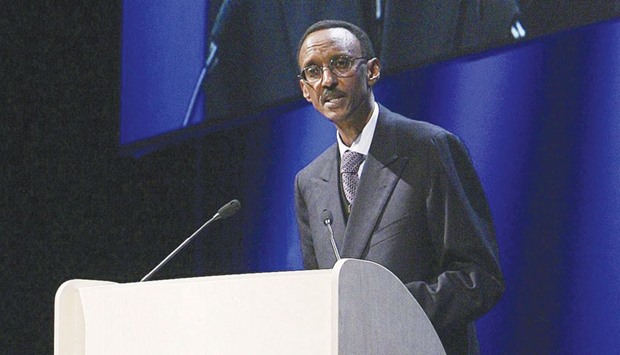Rwandan President Paul Kagame will seek a third term after his current term ends 2017, he announced yesterday.
The revelation ends speculation on whether he will stand again or not.
He has the option of doing so thanks to constitutional changes made in a December 18 referendum.
“You clearly expressed your choices for the future of our country. The process allowed us the time to make certain that the proposed changes had merit and wisdom. You requested me to lead the country again after 2017. Given the importance and consideration you attach to this, I can only accept,” Kagame said in his New Year’s message, delivered just after midnight (2200 GMT on Thursday).
“But I do not think our aim is to have a president for life, nor is it what I would want,” he said, adding sooner rather than later, the office of presidency will be transferred from one person to another.
But he said the transfer must be purposeful, not just to set an example.
Rwandans voted overwhelmingly in the December referendum to lift constitutional restrictions that would have kept Kagame from running again.
More than 98% of voters elected to lift the term limits for Kagame.
The revised constitution allows Kagame to run for a third term in 2017 and potentially stay in power until 2034, despite the opposition slamming the move as undemocratic.
Kagame has been a key figure in Rwandan politics since 1994, when rebels led by him put an end to a genocide by Hutu extremists that left an estimated 800,000 Tutsis and moderate Hutus dead.
He won the 2003 presidential election, and was re-elected in 2010.
Kagame has come under criticism for the move to rewrite the term limit language under which he was elected.
Washington and the European Union have denounced the outcome as undermining democracy in the central African country and called on Kagame to step down in 2017 and allow new faces to emerge.
But he has slammed back at opponents, especially foreign ones, saying that outsiders shouldn’t try to resist the demands of Rwandan voters.
“What remains is to follow the normal laws and procedures when the time comes,” he added.
He said Rwandans were optimistic about the future and “have confidence in the direction chosen. This should reassure Rwanda’s friends and partners as well”.
The referendum followed more than 60% of voters signing a petition calling for the drafting of constitutional changes which would allow Kagame to stand again.
Both houses of parliament are dominated by his Rwandan Patriotic Front (RPF).
Opponents and some international observers say Kagame has effectively stifled democracy in the nation of some 10mn.
But his supporters maintain that Kagame, an English speaker from the Tutsi ethnic group targeted in the genocide by Hutu majority extremists, is not an autocratic figure but a beacon of stability who has overseen economic growth.
Kagame was elected with some 90% of ballots cast both in 2003 and 2010 and he said the outcome of the referendum would determine whether he continued in office.
Afterwards, he insisted he would stay put.
Rwanda’s opposition Green Democratic Party was the only recognised constitutionally accepted party to oppose the constitutional amendments.
The party accused the regime of manoeuvring to keep Kagame in office.
Kagame’s aides have insisted that any bid for a third term would be in response to “popular demand” that he stay in power.
Several African states have recently lifted or tried to lift constitutional bars to multiple presidential mandates.
Such was the case in neighbouring Burundi, which descended into bloodshed in April when President Pierre Nkurunziza announced his intention to run for a controversial third term in a July election that he went on to win.
The violence has continued after Nkurunziza won the election that was boycotted by the opposition.

Kagame: You (Rwandans) clearly expressed your choices for the future of our country ... you requested me to lead the country again after 2017. Given the importance and consideration you attach to this, I can only accept.
